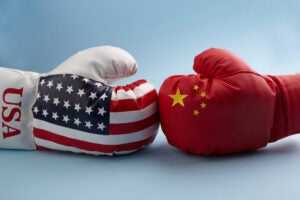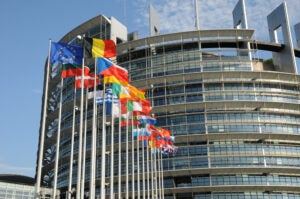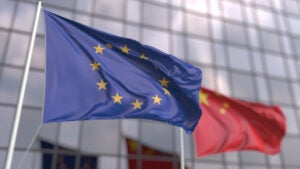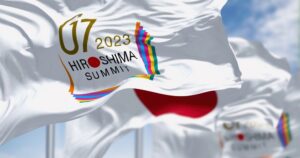Excerpt from piece by David A. Steinberg & Yeling Tan published in The Review of International Organizations.
In recent years, several of the world’s largest economies have adopted more protectionist trade policies. Nowhere is this trend more visible than in the world’s most important trading relationship—that between the US and China. US trade policy has grown substantially more protectionist since 2018, leading to a “trade war” with China and international frictions with other major economies. This protectionist turn appears likely to endure: not only has the Biden administration continued to levy tariffs on China, it has considered imposing new restrictions. Nor has US protectionism been limited to China. For example, one of the Biden administration’s first major trade policy actions involved an increase in tariffs on imports from the United Arab Emirates. Many observers worry that US protectionism could have broader repercussions—inflaming nationalist sentiments, undermining popular support for free trade in target countries, and ultimately weakening the foundations of the international trading system. To this end, this paper examines how foreign protectionism affects public support for trade in target countries.
We argue that public opinion on free trade is affected not just by domestic factors such as education and gender, but also by the actions of foreign countries. Our central hypothesis is that protectionism from abroad reduces public enthusiasm for free trade in target countries. We argue that this decline in public support for trade reflects individuals’ preferences for two distinct types of reciprocity. Existing research on public attitudes towards international politics highlights the importance of direct reciprocity, which refers to declining support for cooperation with countries that do not cooperate. Along these lines, we expect the public to want to retaliate by raising tariffs on imports from the protectionist country…
…The survival of the open trading system will depend in no small part on retaining mass public support for free-trade policies, not just in the US as the world’s most powerful state, but also throughout the rest of the world. The US’ bipartisan shift towards protectionist trade policies has reduced public enthusiasm for free trade in targeted countries, including in the world’s largest exporting nation, China.
|
The annual State of the European Union speech (SOTEU), which Commission presidents deliver to the European Parliament in Strasbourg every September, had never been a particularly exciting occasion. That changed in 2020, when the EU was in the midst of a global race to develop and purchase vaccines against Covid-19, and continued through to last year, when the EU was responding to Putin’s invasion of Ukraine. From 2020 to 2022, Commission President Ursula von der Leyen’s speeches moved away from the technocratic verbiage of years past to grandstanding announcements that often surprised her own officials in Brussels.
With one important exception – the announcement of an investigation into Chinese subsidies for electric vehicles (EVs) – this year’s speech went back to being (relatively) boring. Perhaps the Commission thinks that the crisis is ending and that it can slowly return to its usual, more technical, self. Von der Leyen laid out a range of important but dull policy ideas. But she did not reveal whether she plans to be around to implement them after next year’s Parliamentary elections in June. EU capitals and the European institutions alike agree, however, that she will almost certainly win a second term if she runs for it.
It may not be easy to predict von der Leyen’s next career move. But it was not hard to guess the topics she would touch upon in her legacy speech. She has a strong record on devising the EU’s responses to the pandemic and to the war in Ukraine. She came to office promising to steer Europe through the socalled twin digital and green transitions, and she has stood her ground on both, sometimes against the wishes of her own conservative political family and her most important allies.
Those who were looking for cues on von der Leyen’s energy and climate agenda for a possible second term might have been disappointed, however. The energy crisis seemed to be almost a memory of the past. Von der Leyen was eager to portray Europe’s response to Russia’s weaponisation of gas supplies as a success story, without dwelling much on the energy challenges ahead. One topic she was keener to delve into was the thorny political tension between farming activity and nature conservation. By saying that Europe should find a balance between agriculture and nature conservation, she risked annoying her conservative European People’s Party (EPP), which has been campaigning to thwart nature restoration legislation by portraying it as pitted against the interests of farmers across the EU.
|
|
|
After abruptly abandoning its ‘zero-COVID’ approach in late 2022, China reopened its borders on 8th January 2023. This decision was a welcome surprise, as pandemic control measures were one of the main reasons European companies had had an extraordinarily difficult year in 2022, and the removal of the restrictions gave rise to a belief that a swift economic rebound would follow. International banks revised up their growth forecasts for China, and businesses were expecting a surge in new orders resulting from pent-up Chinese demand.
The political will in China also seemed to finally match businesses’ expectations for increased opening of the economy. At the 14th National People’s Congress, held in March 2023, China’s outgoing premier Li Keqiang delivered the government’s annual work report, reviewing the progress made on development plans from 2022, and setting out the key priorities for the coming year. The gross domestic product (GDP) target for 2023 was set at around five per cent, and Li’s presentation emphasised economic recovery and stability. The work report also outlined aims to encourage more foreign investment. The business community saw these as positive messages, as they suggested the Chinese Government would shift focus from ideological considerations—and an emphasis on self-reliance and national security concerns — to prioritising the economy and re-engagement with the world.
While economic indicators at the beginning of 2023 showed momentum was gathering, as the year progressed, China’s recovery began to wane, with many areas of the economy not performing as expected. A key factor in this was that the much-anticipated release of pent-up demand simply did not take place, resulting in an extended contraction of manufacturing activity, producer prices and industrial profits. While services fared somewhat better than manufacturing, growth in this sector showed signs of slowing after an initial strong rebound. On top of this, a host of serious challenges that China’s economy had already been facing—including mounting government debt and the unravelling of the real estate sector—are yet to be resolved. China’s demographic dividend is also fading, and urban youth unemployment broke historic records for several months in a row in 2023, adding more pressure to the country’s recovery. Official statistics, published until July 2023, suggested that one in five people between the ages of 16 and 24 were out of a job in China’s big cities. This data also highlighted the need for targeted policies in order for domestic consumption to live up to its potential as a key driver for the Chinese economy. Rebuilding consumer confidence will also require measures that can improve the outlook for the real estate sector, in which over 70 per cent of Chinese household wealth is tied up.
|
|
|
|
Excerpts from a policy brief by Ken Ash, a speaker at WITA’s 2023 Virtual Intensive Trade Seminar, which started today. Tickets are still available to purchase individual session passes for Monday or Tuesday’s discussion. Click here.
Is the high point in multilateral trade relations already 30 years in the past? Are notions of international cooperation and mutual benefit relics of an earlier time?
Hopefully not, there is still much more to play for. Amidst the visible geopolitical tensions, and what often looks like a blurring of trade, economic, climate, and security interests, there are some encouraging signs recently.
This brief considers prior developments that helped shape the nature of the trade policy debate today, offers an admittedly optimistic assessment of a renewed interest by G7 members in international cooperation, and highlights immediate priorities for action by G7 Trade Ministers….
When G7 Leaders met in Japan in May 2023, did they take the first tentative steps back from international confrontation and towards reinvigorated international cooperation? The G7 Hiroshima Leaders’ Communiqué is a remarkable document – full credit to the G7 Presidency of Japan. The Communiqué is comprehensive and substantive in its treatment of a wide range of global issues; it emphasizes throughout the unity of G7 members and their commitment both to work together and to engage with international partners.
National security is a central theme of the Communiqué, and support for Ukraine is emphasized. Leaders also prioritize accelerating progress on the Sustainable Development Goals (SDGs) and the transition to a clean energy economy, noting that poverty reduction and climate mitigation go hand in and; cooperating to build economic resilience and economic security across supply chains, and to enable a strong global economic recovery; investing in global health and pandemic preparedness; cooperating on migration and human trafficking; ensuring good governance of artificial intelligence and digital technologies; and strengthening the rules-based multilateral trading system with the WTO at its core.
G7 Leaders emphasize that they are interested in “de-risking” and not in decoupling. This is a significant, deliberate, and welcome change in message and tone. Earlier discourse often implied a much more extensive stepping back from international trade, investment, and overall cooperation. Given the interconnectedness of economies today, decoupling is neither feasible nor desirable and re-discovering this reality would be extremely costly for all countries. An open and inclusive approach for mitigating risks to economic, climate, and security interests based on collaboration across countries, and with the private sector, is both feasible and desirable.
|
|
|





